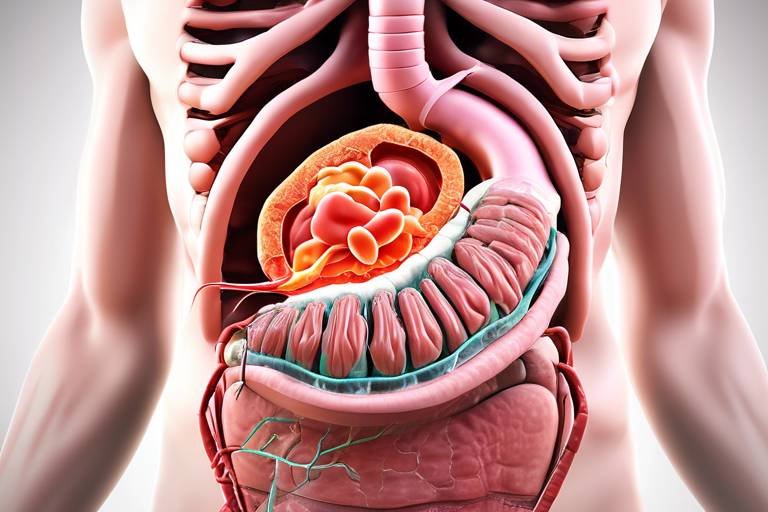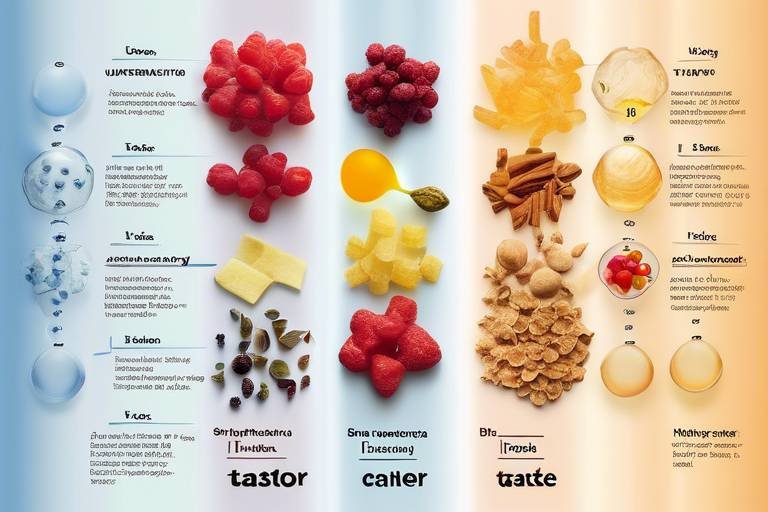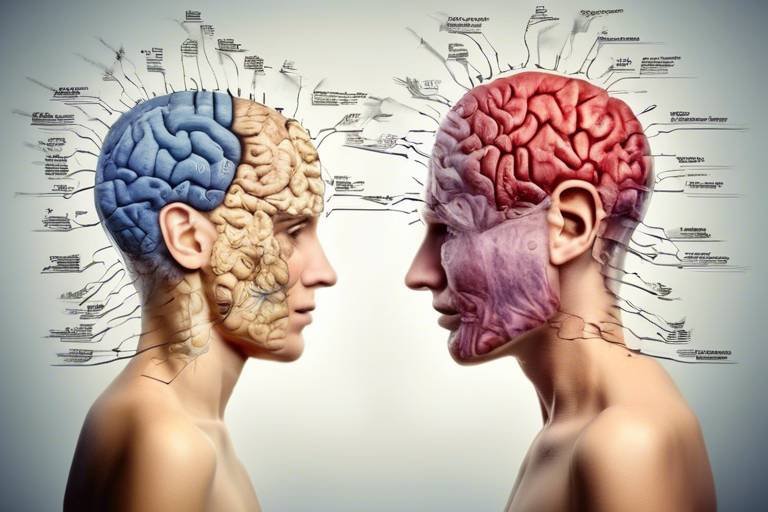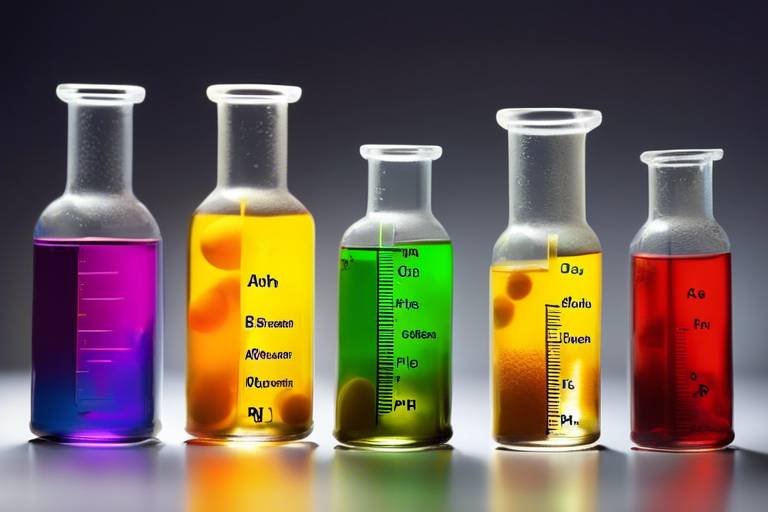The Biology of Digestive Health - What to Know
Have you ever wondered how your body transforms that delicious meal into energy? The digestive system is like a well-oiled machine, intricately designed to break down food into essential nutrients that our bodies crave. But what exactly goes on in this complex network? In this article, we’ll embark on a journey through the fascinating world of digestive health, exploring its mechanisms, the vital roles of enzymes, common disorders that can disrupt our gut, and practical tips to maintain optimal digestive function.
The digestive system consists of a series of organs working in harmony to process the food we eat. It starts at the mouth, where the journey begins with chewing and saliva breaking down food. From there, it travels down the esophagus and into the stomach, where it meets powerful acids and enzymes. The small intestine then takes center stage, absorbing nutrients, while the leftover waste moves into the large intestine for final processing. Each part of this system plays a crucial role, and together, they ensure our bodies receive the nourishment they need to thrive.
Now, let’s talk about the unsung heroes of digestion: digestive enzymes. These specialized proteins are essential for breaking down macronutrients—proteins, carbohydrates, and fats—into smaller, absorbable components. Without these enzymes, our bodies would struggle to extract the nutrients from food, leading to deficiencies and health issues. Understanding how these enzymes work can empower us to make better dietary choices that support our digestive health.
Different enzymes target specific nutrients, each with its unique function. Here’s a brief overview of the major digestive enzymes:
| Enzyme Type | Function | Source |
|---|---|---|
| Proteases | Break down proteins into amino acids | Produced in the stomach and pancreas |
| Amylases | Digest carbohydrates into sugars | Found in saliva and produced by the pancreas |
| Lipases | Break down fats into fatty acids | Secreted by the pancreas and stomach |
Proteases are vital for breaking down proteins into amino acids, which are the building blocks of life. Found in foods like meat, dairy, and legumes, these enzymes are predominantly produced in the stomach and pancreas. A deficiency in proteases can lead to issues like malnutrition and gastrointestinal discomfort, making it essential to include protein-rich foods in your diet.
Amylases play a crucial role in carbohydrate digestion. They begin their work in the mouth, where saliva starts breaking down starches into sugars. Produced by the pancreas, amylases continue their work in the small intestine, ensuring that carbohydrates are efficiently converted into glucose for energy. If you're feeling sluggish after a carb-heavy meal, it might be your body struggling to produce enough amylase!
Lastly, we have lipases, the champions of fat digestion. These enzymes are responsible for breaking down dietary fats into fatty acids, which are essential for various bodily functions, including hormone production and cell structure. Lipases are secreted by the pancreas and stomach, and their effectiveness can significantly impact how well our bodies absorb dietary fats. A diet low in healthy fats may lead to deficiencies in fat-soluble vitamins, so it's crucial to include sources of healthy fats in your meals.
Despite the impressive capabilities of our digestive system, many people experience digestive disorders that can significantly impact their health. Conditions like Irritable Bowel Syndrome (IBS), Gastroesophageal Reflux Disease (GERD), and various food intolerances can lead to discomfort and frustration. Recognizing the symptoms of these disorders is vital for early diagnosis and treatment.
Common symptoms of digestive disorders include:
- Abdominal pain and bloating
- Diarrhea or constipation
- Nausea and vomiting
- Heartburn and acid reflux
Diagnosing these conditions often involves a combination of physical examinations, patient history, and diagnostic tests, such as endoscopies or imaging studies. Early intervention can make a world of difference in managing these disorders.
Treatment for digestive disorders varies widely depending on the specific condition. Some common approaches include:
- Dietary changes to eliminate trigger foods
- Medications to alleviate symptoms
- Lifestyle modifications, such as stress management and regular exercise
Working closely with a healthcare provider can help tailor a treatment plan that best suits individual needs, promoting better digestive health.
So, how can we keep our digestive systems running smoothly? Here are some practical tips:
- Stay hydrated by drinking plenty of water.
- Include fiber-rich foods in your diet, such as fruits, vegetables, and whole grains.
- Limit processed foods and added sugars.
- Practice mindful eating—chew your food thoroughly and avoid distractions during meals.
- Engage in regular physical activity to promote gut motility.
By incorporating these habits into your daily routine, you can significantly enhance your digestive health and overall well-being.
1. What are the signs of a healthy digestive system?
A healthy digestive system typically functions without discomfort, allowing for regular bowel movements, minimal bloating, and no significant food intolerances.
2. How can I improve my digestion naturally?
Incorporating more fiber, staying hydrated, and engaging in regular physical activity can help improve digestion naturally.
3. When should I see a doctor about digestive issues?
If you experience persistent digestive symptoms, such as severe pain, prolonged diarrhea, or unexplained weight loss, it's essential to consult a healthcare professional.

Understanding the Digestive System
The digestive system is not just a series of organs; it's a finely tuned orchestra, harmonizing to convert the food we consume into essential nutrients and energy. Imagine it as a bustling factory where raw materials (your meals) are transformed into valuable products (nutrients) that fuel your body. This intricate network includes the mouth, esophagus, stomach, intestines, and accessory organs like the liver and pancreas, each playing a vital role in digestion.
Starting from the moment you take a bite, the process of digestion begins. In the mouth, food is mechanically broken down by chewing and mixed with saliva, which contains enzymes that initiate the breakdown of carbohydrates. As you swallow, the food travels down the esophagus through a series of muscular contractions known as peristalsis, guiding it into the stomach. Here, the food meets a harsh environment rich in acids and enzymes, where proteins are denatured and further broken down.
Once the food is transformed into a semi-liquid form known as chyme, it moves into the small intestine. This is where the magic truly happens! The small intestine is a long, coiled tube where most of the nutrient absorption takes place. The walls of the small intestine are lined with tiny hair-like structures called villi, which increase the surface area for absorption, allowing nutrients to enter the bloodstream. It’s like a sponge soaking up water, but in this case, it’s your body soaking up vital nutrients.
But wait, there’s more! The pancreas and liver play crucial supporting roles in this digestive drama. The pancreas produces digestive enzymes and bicarbonate to neutralize stomach acid, while the liver produces bile, which emulsifies fats, making them easier to digest. This teamwork ensures that your body can efficiently process fats, proteins, and carbohydrates.
After the nutrients are absorbed in the small intestine, the leftover waste moves into the large intestine. Here, water is reabsorbed, and the remaining material is compacted into feces. This part of the digestive system is essential for maintaining hydration and eliminating waste. Think of it as the final cleanup crew, ensuring that everything that isn’t useful is efficiently disposed of.
In summary, the digestive system is a remarkable and complex network that is critical for your overall health. It not only breaks down food but also plays a significant role in nutrient absorption and waste elimination. Understanding how this system works can empower you to make informed choices about your diet and lifestyle, ultimately enhancing your digestive health.
- What are the main functions of the digestive system? The main functions include breaking down food, absorbing nutrients, and eliminating waste.
- How long does digestion take? Digestion can take anywhere from 24 to 72 hours, depending on the individual and the type of food consumed.
- What can I do to improve my digestive health? Eating a balanced diet rich in fiber, staying hydrated, and exercising regularly can help maintain good digestive health.

The Role of Enzymes in Digestion
Enzymes are the unsung heroes of our digestive system, tirelessly working behind the scenes to ensure that our bodies can effectively break down food and absorb vital nutrients. Without these remarkable proteins, the process of digestion would be an uphill battle, making it nearly impossible for us to derive the energy and nourishment we need from the foods we consume. Think of enzymes as tiny workers in a factory, each with a specific job to do, ensuring that everything runs smoothly and efficiently.
When we eat, our bodies trigger the release of various digestive enzymes that target specific macronutrients: proteins, carbohydrates, and fats. Each enzyme has a unique role, and together they form a well-oiled machine that supports our digestive health. For instance, proteases break down proteins into amino acids, while amylases tackle carbohydrates, and lipases focus on fats. This intricate dance of enzymatic action is essential for nutrient absorption, allowing our bodies to utilize the food we eat to its fullest potential.
Here's a closer look at how these enzymes function:
| Type of Enzyme | Function | Source |
|---|---|---|
| Proteases | Break down proteins into amino acids | Stomach, pancreas |
| Amylases | Digest carbohydrates into simple sugars | Saliva, pancreas |
| Lipases | Break down fats into fatty acids and glycerol | Pancreas, stomach |
Each type of enzyme is produced in specific locations within the digestive tract. For example, salivary amylase starts the carbohydrate digestion process right in your mouth, while gastric proteases kick into gear in the stomach. This localized production ensures that the right enzymes are available at the right time, maximizing the efficiency of digestion.
Moreover, the effectiveness of these enzymes can be influenced by various factors, including pH levels, temperature, and the presence of certain nutrients. For instance, proteases thrive in the acidic environment of the stomach, while amylases prefer a more neutral pH found in the small intestine. Understanding these nuances can help us appreciate the delicate balance our bodies maintain to achieve optimal digestion.
However, it’s important to note that enzyme deficiencies can lead to digestive disorders. For example, individuals with lactose intolerance lack the enzyme lactase, which is necessary for breaking down lactose, the sugar found in milk. This deficiency can result in uncomfortable symptoms like bloating, gas, and diarrhea. Similarly, other enzyme deficiencies can lead to malabsorption of nutrients, causing a cascade of health issues.
In conclusion, enzymes play a crucial role in digestion, ensuring that our bodies can break down food effectively and absorb essential nutrients. By understanding the importance of these biological catalysts, we can take steps to support our digestive health, whether through diet, supplementation, or lifestyle changes. Remember, a well-functioning digestive system is the cornerstone of overall health and well-being.
- What are digestive enzymes? Digestive enzymes are proteins that help break down food into smaller, absorbable components.
- How do I know if I have an enzyme deficiency? Symptoms such as bloating, gas, and diarrhea after eating certain foods can indicate an enzyme deficiency.
- Can I take enzyme supplements? Yes, enzyme supplements can be beneficial, especially for those with specific deficiencies. However, it's best to consult a healthcare professional before starting any supplementation.
- What foods can help boost enzyme production? Foods rich in probiotics, such as yogurt and fermented vegetables, can help promote healthy enzyme production in the gut.

Types of Digestive Enzymes
Digestive enzymes are the unsung heroes of our digestive system, working tirelessly to break down the food we consume into absorbable nutrients. Without these vital enzymes, our bodies would struggle to extract the energy and building blocks necessary for survival. In this section, we will explore the various types of digestive enzymes, their specific roles, and why they are crucial for our overall health.
Digestive enzymes can be categorized based on the type of macronutrient they target. Here are the primary types:
- Proteases: These enzymes are responsible for breaking down proteins into smaller peptides and amino acids. They are produced mainly in the stomach and pancreas, and they play a vital role in ensuring that our bodies can utilize the proteins we consume.
- Amylases: Amylases are the enzymes that tackle carbohydrates. They begin their work in the mouth with saliva and continue in the small intestine, helping to convert starches into sugars that our bodies can easily absorb.
- Lipases: These enzymes are essential for fat digestion. They break down dietary fats into fatty acids and glycerol, allowing for their absorption in the intestines. Lipases are primarily secreted by the pancreas.
Each type of enzyme has a specific function, and their collaboration is what makes digestion possible. For instance, while proteases break down proteins, the resulting amino acids are then utilized by the body for various functions, including muscle repair and hormone production. Similarly, amylases convert starches into sugars, which are crucial for energy production. Lipases, on the other hand, ensure that fats are effectively digested so that our bodies can absorb fat-soluble vitamins and essential fatty acids.
To illustrate the importance of these enzymes, consider this analogy: think of your digestive system as a finely tuned orchestra. Each enzyme acts as a musician, playing its unique part to create a harmonious symphony of digestion. If one musician is out of tune or missing, the entire performance can falter. This is why understanding and supporting our digestive enzymes is key to maintaining digestive health.
Moreover, enzyme production can be affected by various factors, including age, diet, and health conditions. For example, as we age, our body may produce fewer enzymes, potentially leading to digestive issues. Similarly, certain medical conditions can impair enzyme production or function, resulting in malabsorption and nutritional deficiencies.
In conclusion, the types of digestive enzymes—proteases, amylases, and lipases—each play a unique and essential role in breaking down the food we eat. By ensuring that our bodies produce and utilize these enzymes effectively, we can enhance our overall digestive health and well-being.

Proteases
Proteases, often referred to as proteinases or peptidases, are a group of enzymes that play a vital role in the digestion of proteins. They work by breaking down complex protein molecules into smaller peptides and ultimately into amino acids, which are the building blocks of life. Without these incredible enzymes, our bodies would struggle to utilize the proteins we consume, leading to a myriad of health issues. Imagine trying to build a house without the right tools; that’s what it would be like for your body without proteases!
These enzymes are produced in various parts of the digestive system, including the stomach and pancreas. In the stomach, the acidic environment activates pepsinogen into pepsin, the primary protease that begins the protein digestion process. Then, as the partially digested food moves into the small intestine, the pancreas secretes additional proteases like trypsin and chymotrypsin, which further break down proteins into absorbable amino acids.
Protease deficiencies can lead to several health problems, such as malnutrition, muscle wasting, and even immune dysfunction. When the body cannot adequately digest proteins, it may not absorb essential nutrients, resulting in a domino effect of health issues. For instance, individuals with conditions like pancreatic insufficiency may require supplemental proteases to aid digestion and nutrient absorption.
Here’s a quick overview of some common sources of proteases:
- Animal Sources: Found in meats, dairy products, and eggs.
- Plant Sources: Present in foods like papaya (which contains papain) and pineapple (which contains bromelain).
- Microbial Sources: Certain bacteria and fungi also produce proteases, which are often used in supplements.
In conclusion, proteases are essential for effective digestion and overall health. They not only help in breaking down proteins but also play a crucial role in various physiological processes, including metabolism and immune function. Ensuring an adequate intake of protease-rich foods or supplements can significantly benefit those struggling with digestive issues. So next time you enjoy a protein-packed meal, remember the hardworking proteases that are making it all possible!

Amylases
Amylases are a vital group of enzymes that play a crucial role in the digestion of carbohydrates. They are responsible for breaking down complex carbohydrates, such as starch, into simpler sugars like glucose, which can then be easily absorbed by the body. Imagine trying to fit a large puzzle piece into a small hole; without amylases, your body would struggle to utilize the energy stored in those complex carbohydrates. These enzymes are produced primarily in the saliva and the pancreas, making their presence essential right from the moment food enters your mouth.
There are two main types of amylases: salivary amylase and pancreatic amylase. Salivary amylase, also known as ptyalin, begins the digestion process in the mouth. As you chew, it works to break down starches into maltose and dextrin, setting the stage for further digestion. Once the food reaches the small intestine, pancreatic amylase takes over, continuing the breakdown of carbohydrates into simple sugars. This two-step process ensures that carbohydrates are efficiently digested and absorbed, providing the body with the necessary energy to function.
Interestingly, the effectiveness of amylases can be influenced by several factors, including pH levels, temperature, and the presence of other nutrients. For example, the acidic environment of the stomach can temporarily halt the action of salivary amylase, while pancreatic amylase thrives in the more alkaline conditions of the small intestine. This delicate balance is crucial for optimal digestion, and any disruption can lead to digestive issues.
Moreover, certain health conditions can affect the production and function of amylases. For instance, individuals with pancreatic disorders may experience insufficient enzyme production, leading to malabsorption and nutrient deficiencies. Symptoms of such conditions may include bloating, diarrhea, and weight loss. In contrast, some people may have an overproduction of amylases, which can indicate underlying health issues. Regular monitoring and consultation with healthcare professionals can help manage these conditions effectively.
To sum up, amylases are indispensable for carbohydrate digestion. They not only facilitate the breakdown of complex carbohydrates into simpler sugars but also play a significant role in ensuring that your body can absorb and utilize these nutrients efficiently. Maintaining a balanced diet that includes adequate carbohydrates, along with proper hydration, can support the optimal function of amylases and overall digestive health.

Lipases
Lipases are a group of essential enzymes that play a pivotal role in the digestive process, particularly in the breakdown of dietary fats. These enzymes catalyze the hydrolysis of triglycerides, which are the main constituents of body fat in humans and other animals, as well as vegetable fat. Without lipases, our bodies would struggle to absorb the fats we consume, which are vital for energy, cell growth, and overall health. Imagine trying to fuel a car without the right kind of fuel—similarly, our bodies need these enzymes to effectively utilize fats.
Produced primarily in the pancreas, lipases are secreted into the small intestine where they perform their magic. They work by breaking down triglycerides into free fatty acids and glycerol, making it easier for the body to absorb these nutrients. This process is crucial because fats are dense sources of energy and are necessary for the absorption of fat-soluble vitamins such as A, D, E, and K. Without adequate lipase activity, individuals may experience malabsorption issues, leading to deficiencies and a host of health problems.
There are several types of lipases, each with specific functions and sources. The most notable types include:
- Pancreatic Lipase: This is the primary enzyme responsible for fat digestion in the small intestine. It accounts for about 80% of the lipase activity in the digestive tract.
- Gastric Lipase: Secreted in the stomach, this enzyme begins the digestion of dietary fats, particularly in infants, where it plays a more significant role due to the high-fat content of breast milk.
- Lingual Lipase: Produced in the mouth, this enzyme starts the digestion of fats while food is still being chewed, though its role is minimal compared to pancreatic lipase.
Understanding the importance of lipases extends beyond just knowing their function. Disorders related to lipase activity can lead to significant health issues. For instance, a deficiency in pancreatic lipase can cause steatorrhea, a condition characterized by the presence of excess fat in the stool, which can lead to weight loss and nutritional deficiencies. Moreover, certain conditions, such as pancreatitis, can impair lipase production, exacerbating digestive issues.
To ensure optimal lipase activity, it's essential to maintain a balanced diet rich in healthy fats, such as those found in avocados, nuts, and fish. Additionally, staying hydrated helps support overall digestive health, allowing enzymes to function effectively. If you're experiencing digestive discomfort or suspect issues with fat digestion, consulting a healthcare professional is crucial. They may recommend dietary adjustments or enzyme supplements to aid in digestion.
In summary, lipases are not just another group of enzymes; they are vital players in the grand symphony of digestion, ensuring that our bodies can access the energy and nutrients locked within the fats we consume. By understanding their role and taking steps to support their function, we can pave the way for better digestive health and overall well-being.
1. What are lipases?
Lipases are enzymes that help break down dietary fats into fatty acids and glycerol, enabling their absorption in the body.
2. Where are lipases produced?
The majority of lipases are produced in the pancreas, but they are also secreted in smaller amounts in the stomach and mouth.
3. What happens if there is a deficiency in lipases?
A deficiency can lead to malabsorption of fats, resulting in symptoms like steatorrhea (fatty stools), weight loss, and nutritional deficiencies.
4. Can I take lipase supplements?
Yes, lipase supplements are available and can help individuals with digestive issues related to fat absorption, but it's best to consult a healthcare professional before starting any supplementation.

Common Digestive Disorders
Digestive disorders can significantly impact our overall health and well-being, often leading to discomfort and a range of symptoms that can disrupt daily life. Understanding these disorders is crucial for anyone who has ever experienced digestive issues or wants to maintain their digestive health. Some of the most common digestive disorders include Irritable Bowel Syndrome (IBS), Gastroesophageal Reflux Disease (GERD), and various food intolerances. Each of these conditions presents unique challenges and symptoms, which can vary widely from person to person.
IBS is a functional gastrointestinal disorder characterized by a combination of symptoms, including abdominal pain, bloating, and changes in bowel habits, such as diarrhea or constipation. It can be triggered by stress, certain foods, or hormonal changes, making it a complex condition to manage. Many individuals with IBS find that keeping a food diary helps them identify trigger foods that exacerbate their symptoms. On the other hand, GERD occurs when stomach acid frequently flows back into the esophagus, leading to symptoms such as heartburn and acid regurgitation. This condition can be particularly troublesome at night, affecting sleep quality and overall comfort.
Food intolerances, such as lactose intolerance or gluten sensitivity, can also lead to significant digestive distress. These intolerances occur when the body has difficulty digesting certain substances, resulting in symptoms like gas, bloating, and diarrhea after consuming trigger foods. It's important to note that food intolerances differ from food allergies, which involve an immune response and can be life-threatening.
To better understand these disorders, let's take a closer look at their symptoms and potential treatments:
| Disorder | Common Symptoms | Potential Treatments |
|---|---|---|
| IBS | Abdominal pain, bloating, diarrhea, constipation | Dietary changes, stress management, medications |
| GERD | Heartburn, acid regurgitation, difficulty swallowing | Dietary adjustments, antacids, prescription medications |
| Food Intolerances | Gas, bloating, diarrhea, nausea | Avoidance of trigger foods, enzyme supplements |
Recognizing the symptoms of these disorders is crucial for early diagnosis and effective management. If you find yourself experiencing persistent digestive issues, it’s advisable to consult a healthcare professional who can help identify the underlying cause and recommend appropriate treatments. Diagnostic methods may include physical examinations, blood tests, or imaging studies, depending on the suspected condition.
Effective treatment options can vary widely depending on the specific disorder. For IBS, many people benefit from a combination of dietary changes—such as following a low FODMAP diet—and stress management techniques like yoga or meditation. GERD may require lifestyle changes such as avoiding spicy foods, eating smaller meals, and elevating the head during sleep. In cases of food intolerances, the most straightforward approach is to eliminate the offending food from your diet, which can lead to significant improvements in symptoms.
In conclusion, understanding common digestive disorders is essential for maintaining digestive health. By recognizing symptoms early and seeking appropriate treatment, individuals can manage their conditions effectively and improve their quality of life. Remember, your digestive health is a reflection of your overall well-being, so take the necessary steps to keep it in check!
- What are the signs of a digestive disorder? Symptoms can vary but may include bloating, gas, abdominal pain, diarrhea, and constipation.
- How can I improve my digestive health? Maintaining a balanced diet, staying hydrated, exercising regularly, and managing stress can all contribute to better digestive health.
- When should I see a doctor? If you experience persistent digestive symptoms that interfere with your daily life, it's important to consult a healthcare provider.

Symptoms and Diagnosis
Recognizing the symptoms of digestive disorders is crucial for early diagnosis and effective treatment. Many people often brush off digestive issues, thinking they are just a normal part of life. However, persistent symptoms can indicate underlying problems that need attention. Common symptoms associated with digestive disorders include:
- Abdominal Pain: This can range from mild discomfort to severe cramping, often signaling issues like Irritable Bowel Syndrome (IBS) or gastritis.
- Bloating: A feeling of fullness or swelling in the abdomen can be caused by gas, constipation, or food intolerances.
- Diarrhea or Constipation: Changes in bowel habits are key indicators of digestive health. Frequent diarrhea may suggest infections or inflammatory bowel disease, while constipation can indicate a slower digestive process.
- Nausea or Vomiting: These symptoms can arise from various causes, including food poisoning, GERD, or more serious conditions like pancreatitis.
- Heartburn: A burning sensation in the chest after eating can signal gastroesophageal reflux disease (GERD).
To diagnose these conditions, healthcare providers typically use a combination of patient history, physical examinations, and diagnostic tests. During your visit, the doctor will likely ask about your symptoms, lifestyle, and diet, which can provide valuable insight into your digestive health.
Diagnostic methods may include:
- Blood Tests: These can help identify infections, inflammation, or deficiencies that may be affecting your digestive system.
- Stool Tests: Analyzing stool samples can reveal infections, malabsorption issues, or the presence of blood.
- Imaging Tests: Techniques like X-rays, CT scans, or ultrasounds can visualize the organs involved in digestion, helping to identify blockages or abnormalities.
- Endoscopy: This procedure allows doctors to view the digestive tract using a flexible tube with a camera, helping to diagnose conditions like ulcers or tumors.
It’s important to communicate openly with your healthcare provider about your symptoms. Keeping a symptom diary can be particularly helpful, as it allows you to track what you eat, when symptoms occur, and their severity. This information can guide your doctor in making an accurate diagnosis and developing an effective treatment plan.
In conclusion, being aware of the symptoms and understanding the diagnostic process can empower you to take control of your digestive health. If you notice persistent issues, don’t hesitate to seek medical advice. Remember, your digestive system plays a vital role in your overall well-being, and addressing any concerns promptly can lead to a healthier, happier life.
Q: What should I do if I experience persistent digestive issues?
A: It's essential to consult with a healthcare provider. They can help identify the underlying cause and recommend appropriate treatment.
Q: Are there lifestyle changes that can improve digestive health?
A: Yes! Eating a balanced diet rich in fiber, staying hydrated, and managing stress can significantly enhance digestive health.
Q: How can I differentiate between normal digestive discomfort and a serious condition?
A: If your symptoms are severe, persistent, or accompanied by other alarming signs like weight loss or blood in your stool, seek medical attention immediately.

Treatment Options
Treating digestive disorders can feel like navigating a maze, with various paths leading to different outcomes. The right treatment often depends on the specific disorder, its severity, and individual patient needs. For instance, conditions like Irritable Bowel Syndrome (IBS) or Gastroesophageal Reflux Disease (GERD) require tailored approaches. Many people find that a combination of dietary changes, medications, and lifestyle modifications can significantly enhance their digestive health.
Dietary changes are often the first line of defense. For instance, individuals with IBS may benefit from a low-FODMAP diet, which reduces certain carbohydrates that can trigger symptoms. On the other hand, those suffering from GERD might find relief by avoiding spicy foods, caffeine, and acidic items like tomatoes and citrus fruits. It’s essential to keep a food diary to identify triggers and patterns, as this can help in customizing a diet that works best for you.
Medications also play a crucial role in managing digestive disorders. Over-the-counter options, such as antacids, can provide quick relief for acid reflux symptoms, while prescription medications like proton pump inhibitors (PPIs) may be necessary for more severe cases. For IBS, doctors might prescribe medications that target specific symptoms, such as diarrhea or constipation. However, it’s vital to consult with a healthcare provider before starting any medication, as they can help guide you through potential side effects and interactions.
Lifestyle modifications can also make a significant difference. Regular exercise can help stimulate digestion and reduce stress, which is often a contributing factor to digestive issues. Techniques such as yoga and meditation can promote relaxation and improve gut health. Additionally, staying hydrated is crucial; water helps to break down food and absorb nutrients effectively. The general recommendation is to drink at least eight glasses of water a day, but individual needs may vary.
| Treatment Type | Description | Examples |
|---|---|---|
| Dietary Changes | Adjusting food intake to minimize symptoms. | Low-FODMAP diet, avoiding trigger foods |
| Medications | Pharmaceutical interventions to manage symptoms. | Antacids, proton pump inhibitors, laxatives |
| Lifestyle Modifications | Changes in daily habits to support digestive health. | Regular exercise, hydration, stress management |
In summary, effectively managing digestive disorders often requires a multi-faceted approach. It’s not just about treating the symptoms; it’s about understanding the underlying causes and making informed choices. Consulting with healthcare professionals, such as dietitians or gastroenterologists, can provide valuable insights tailored to your specific situation. Remember, every body is unique, and what works for one person may not work for another. The key is to stay proactive, informed, and open to adjusting your approach as needed.
- What are the most common digestive disorders? Some common digestive disorders include IBS, GERD, Crohn's disease, and celiac disease.
- How can I tell if I have a digestive disorder? Symptoms like persistent abdominal pain, bloating, gas, diarrhea, or constipation may indicate a digestive disorder. It's best to consult a healthcare professional for an accurate diagnosis.
- Are there any natural remedies for digestive health? Yes, natural remedies such as probiotics, ginger, and peppermint tea can help improve digestion and reduce symptoms.
- How important is diet in managing digestive disorders? Diet plays a crucial role in managing digestive disorders, as certain foods can exacerbate symptoms while others can promote healing.

Maintaining Digestive Health
Maintaining digestive health is not just about what you eat; it's about how you live. Think of your digestive system as a finely tuned engine. If you neglect the fuel, the oil, or the maintenance, it won’t run smoothly. So, how do you keep this engine running at peak performance? Here are some essential strategies to consider.
First and foremost, diet plays a crucial role in digestive health. A balanced diet rich in fiber can work wonders for your gut. Fiber acts like a broom, sweeping through your intestines and keeping everything moving along. Foods like fruits, vegetables, whole grains, and legumes are fantastic sources of fiber. Not only do they help prevent constipation, but they also promote a healthy gut microbiome, which is essential for overall health.
Moreover, hydration is often overlooked but is key to digestive health. Water helps to dissolve nutrients and soluble fiber, making it easier for your body to absorb them. Aim for at least 8 glasses of water a day, but remember, your needs may vary depending on your activity level and climate. If you find it hard to drink plain water, consider herbal teas or infusing your water with fruits for a refreshing twist.
Another important aspect is regular physical activity. Exercise stimulates the digestive tract, helping food move through your system more efficiently. Even a simple walk after meals can aid digestion and help prevent bloating. You don’t have to be a gym rat; just find an activity you enjoy, whether it’s dancing, hiking, or playing a sport. It’s all about keeping that engine running smoothly!
Stress management is equally vital. When you’re stressed, your body goes into fight-or-flight mode, which can disrupt your digestive processes. Techniques like yoga, meditation, or even deep-breathing exercises can help calm your mind and, in turn, support your digestive health. Remember, a calm mind contributes to a healthy gut.
Lastly, listen to your body. If certain foods make you feel uncomfortable, it might be worth considering an elimination diet to identify potential food intolerances. Keeping a food diary can help you track what you eat and how it affects your digestion. Knowledge is power, and understanding your body’s signals can lead to better choices.
- What foods are best for digestive health? Foods high in fiber, such as fruits, vegetables, and whole grains, are excellent for maintaining digestive health.
- How much water should I drink daily? Aim for at least 8 glasses a day, but adjust based on your activity level and climate.
- Can stress affect my digestion? Yes, stress can disrupt digestive processes, so managing stress is crucial for gut health.
- What should I do if I suspect a food intolerance? Consider keeping a food diary and consult with a healthcare provider for personalized advice.
Frequently Asked Questions
- What is the digestive system and how does it work?
The digestive system is a complex network of organs that work together to break down food into essential nutrients. It starts in the mouth, where food is chewed and mixed with saliva, and continues through the esophagus, stomach, and intestines, where various enzymes and acids play crucial roles in digestion. Think of it as a well-oiled machine, where each part has a specific function to ensure that our bodies can absorb the nutrients needed for energy and health.
- What are digestive enzymes and why are they important?
Digestive enzymes are proteins that help break down macronutrients—proteins, carbohydrates, and fats—into smaller molecules that the body can absorb. Without these enzymes, our bodies would struggle to utilize the food we eat. They act like tiny scissors, cutting up large food particles into manageable pieces, which is essential for proper digestion and nutrient absorption.
- What are some common digestive disorders?
Common digestive disorders include Irritable Bowel Syndrome (IBS), Gastroesophageal Reflux Disease (GERD), and food intolerances. Each of these conditions can cause various symptoms, such as bloating, gas, heartburn, and abdominal pain. It's important to recognize these signs early, as they can significantly impact your quality of life.
- How can I maintain good digestive health?
Maintaining good digestive health involves a combination of dietary choices, hydration, and lifestyle habits. Eating a balanced diet rich in fiber, staying hydrated, and incorporating regular exercise can greatly enhance your digestive function. Think of your digestive system like a garden; with the right care and attention, it can flourish and thrive!
- What symptoms should I look out for that indicate a digestive issue?
Some common symptoms of digestive issues include prolonged bloating, persistent heartburn, irregular bowel movements, and unexplained weight changes. If you experience any of these symptoms frequently, it’s a good idea to consult with a healthcare professional for proper diagnosis and treatment.
- What treatment options are available for digestive disorders?
Treatment options for digestive disorders can vary widely depending on the specific condition. They may include dietary changes, medications, and lifestyle modifications. For instance, someone with IBS might benefit from a low-FODMAP diet, while others may require medications to manage symptoms. It's essential to work with a healthcare provider to find the best approach for your individual needs.



















